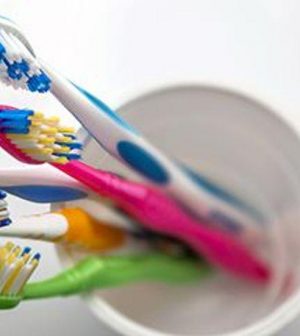- Could Your Grocery Store Meat Be Causing Recurring UTIs?
- Are You Making This Expensive Thermostat Error This Winter?
- Recognizing the Signs of Hypothyroidism
- 10 Strategies to Overcome Insomnia
- Could Artificial Sweeteners Be Aging the Brain Faster?
- Techniques for Soothing Your Nervous System
- Does the Water in Your House Smell Funny? Here’s Why
- Can a Daily Dose of Apple Cider Vinegar Actually Aid Weight Loss?
- 6 Health Beverages That Can Actually Spike Your Blood Sugar
- Treatment Options for Social Anxiety Disorder
Your Toothbrush Could Be a Life Saver in the Hospital

A person’s toothbrush could be a true lifesaver if they land in a hospital ICU, according to new evidence review.
Regular toothbrushing is associated with lower rates of death in the intensive care unit (ICU), shorter lengths of stay, and shorter times spent on a mechanical ventilator, researchers report in the Dec. 18 issue of the journal JAMA Internal Medicine.
That’s because daily toothbrushing appears to protect patients against developing pneumonia while they’re hospitalized, researchers said.
“The signal that we see here towards lower mortality is striking—it suggests that regular toothbrushing in the hospital may save lives,” said researcher Dr. Michael Klompas, a hospital epidemiologist and an infectious disease physician in the department of medicine at Brigham and Women’s Hospital in Boston.
“It’s rare in the world of hospital preventative medicine to find something like this that is both effective and cheap,” Klompas added in a hospital news release. “Instead of a new device or drug, our study indicates that something as simple as brushing teeth can make a big difference.”
For the study, Klompas and his colleagues combined results from 15 clinical trials involving more than 2,700 patients.
They found that pneumonia rates were lower among patients who received daily toothbrushing, particularly those on mechanical ventilation.
Toothbrushing also decreased the risk of dying in an ICU and shortened the length of time patients needed intensive care.
Pneumonia occurs when bacteria in the mouth are sucked down a patient’s airways and infect their lungs, researchers said. Frail patients or people with a weakened immune system are particularly at risk for developing pneumonia during their hospital stay.
A daily toothbrushing regimen decreases the amount of bacteria in the mouth, potentially lowering the risk of pneumonia, researchers said.
Most of the studies in the review focused on ventilated patients in an ICU, but the researchers believe that the protective effects of toothbrushing should extend to other hospital patients.
“The findings from our study emphasize the importance of implementing an oral health routine that includes toothbrushing for hospitalized patients,” Klompas said. “Our hope is that our study will help catalyze policies and programs to assure that hospitalized patients regularly brush their teeth. If a patient cannot perform the task themselves, we recommend a member of the patient’s care team assist.”
More information
The Mayo Clinic has more about pneumonia.
SOURCE: Brigham and Women’s Hospital, news release, Dec. 18, 2023
Source: HealthDay
Copyright © 2026 HealthDay. All rights reserved.










